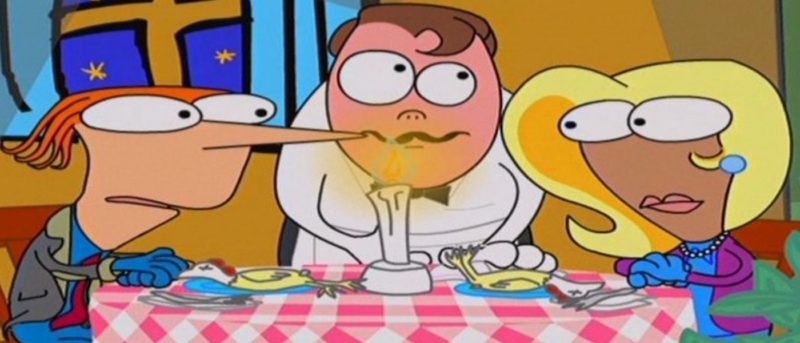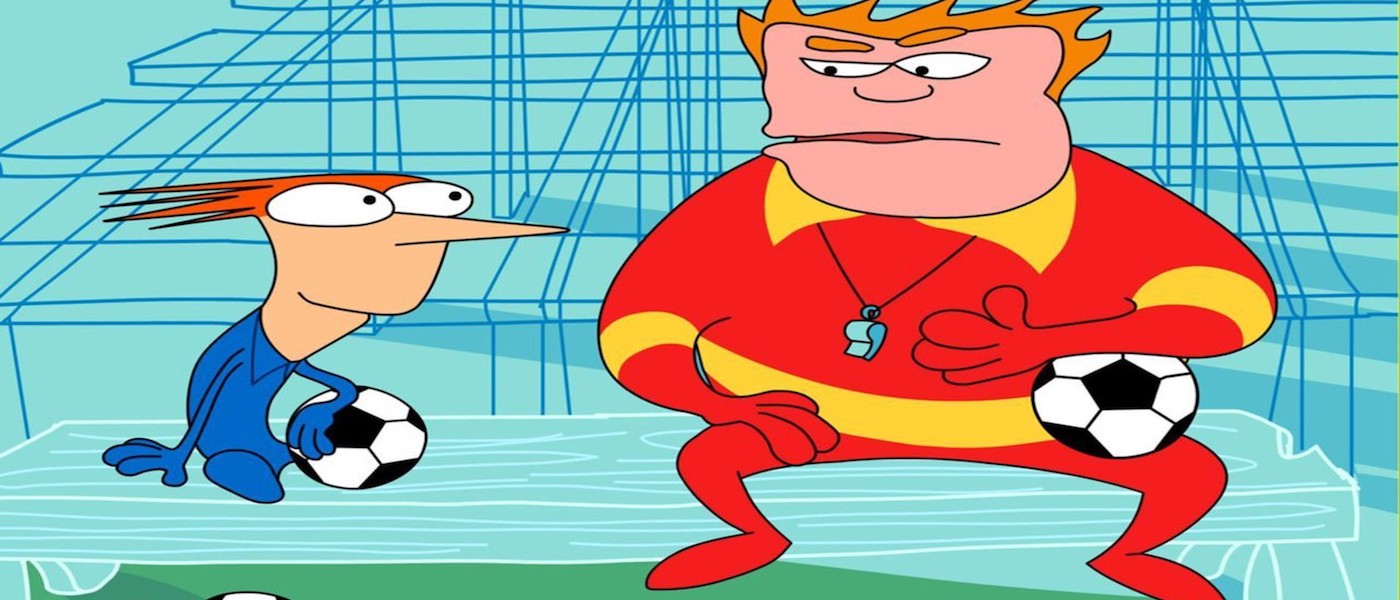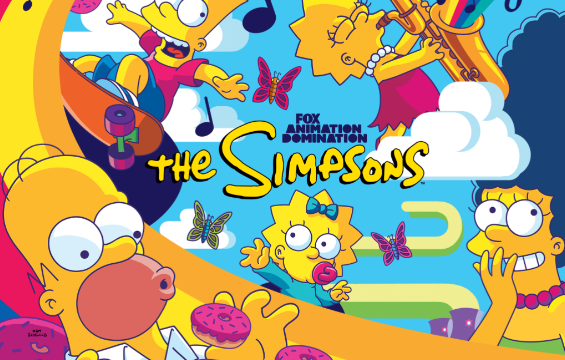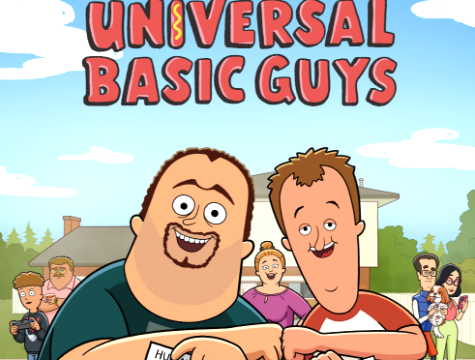“Home Movies” Needed To Die So “Bob’s Burgers” Could Live
Everybody knows Bob’s Burgers.
It airs on television every day. It has comic books, action figures, and Halloween costumes. They’ve invaded The Simpsons and Archer. Real burger joints have even turned themselves into living versions of the fictional burger chain. Bob’s Burgers isn’t just a popular television show, but it’s become a legitimate phenomenon and it’s one of the few shows on TV that conjures such a feeling of positivity. Created by Loren Bouchard, Bob’s Burgers is now a permanent fixture of many people’s viewing schedules. However, before the birth of Bob’s Burgers, Loren Bouchard was working on another animated series, Home Movies, which has gone on to achieve cult status over time. With Home Movies now over 20 years old and Bob’s Burgers about to celebrate its first feature film, it feels like the perfect time to examine how one show never could have existed if it wasn’t for the demise of the other.
Loren Bouchard is now one of the biggest names in animation, but after he came off of his successful run of Dr. Katz, Professional Therapist on Comedy Central, he was still someone eager to prove themselves. Bouchard’s follow-up to Dr. Katz was a series that he created with Brendon Small called Home Movies. The unconventional animated series looks at Brendon Small, a young boy who’s raised by a single mother and uses his love for movies and filmmaking as a means of escapism. The “Squigglevision” style of the show’s first season was too rough for some audiences to get past, but underneath this crude exterior was a hilarious and insightful animated series.
Home Movies showcases a cast of exceptional talent, but there are tons of names from Bob’s Burgers that originally showed up on Home Movies, sometimes in incredibly similar roles. Eugene Mirman, Ron Lynch, and Melissa Galsky were all important presences on Home Movies. Even Laura and Sarah Silverman’s characters on Bob’s Burgers, Andy and Ollie, are basically more grounded versions of Home Movies’ fan favorite characters Walter and Perry. Furthermore, much like the Belchers, the Small family were also lower-middle class and many episodes in both series realistically depict the frustrations and difficulties associated with this societal status. Home Movies was slightly a little more cynical, but Bouchard has been able to work this negativity out of his system before the wholesome nature of Bob’s Burgers.
There’s truly not a weak link in the cast, but the real gem of the series is Jon Benjamin. If nothing else, Home Movies was instrumental towards how it helped further establish Benjamin’s talent as a voice actor. He was already a mainstay in Bouchard’s previous animated series, Dr. Katz, Professional Therapist, but it’s Home Movies where he really got to unleash himself and show audiences just how perfect his delivery can be. Coach McGuirk is literally one of the greatest characters ever committed to television.
One of the most defining elements of Home Movies is the highly improvised nature of the show’s dialogue. Home Movies is incredibly conversational and characters often speak over one another in a very natural way. The first season of Home Movies actually operated with no scripts and the animation for the episodes was later retrofitted to match the improvised conversations that the actors had.
This process ultimately turned out to be laborious and risky, so from the second season onward Home Movies started writing scripts, but the actors were still encouraged to keep it loose with their lines. This style is also present in the dialogue of Bob’s Burgers. The show doesn’t feel nearly as loose as the first season of Home Movies, but the overlapping, naturalistic approach to conversation is still a fundamental part of show. It’s part of the reason why the characters in both series feel so down to Earth and approachable.

Many of the episodes of Home Movies revolve around how Brendon’s films are parodies of actual movies, and not just nebulous pastiches. There are certainly traces of this flair for satirical pop culture in Bob’s Burgers, like how the show will indulge in an elementary school production of Working Girl mixed with Die Hard, or that there are episodes that are direct references to cultural cinematic touchstones like E.T. or Jaws. Bob’s Burgers’ many musical numbers, which are plentiful in the series, are meant to be riffs on existing songs. Home Movies may, unsurprisingly, be more preoccupied with film than Bob’s Burgers, but this love of cinema is still present. What’s more important is that Bouchard’s parody skills were able to develop and refine themselves over Home Movies’ four seasons.
One of the biggest elements from Home Movies that carried over to Bob’s Burgers is the show’s intense love for musical numbers. Granted, in Home Movies all of the show’s music was provided by Brendon Small, but Bouchard still understood the power of a well-placed song. Musical numbers slowly became more prevalent and elaborate in Home Movies, with some installments containing entire rock operas (based on Kafka’s Metamorphosis, no less). The series would contain so much music that Home Movies’ fourth season DVD set actually included a CD of 52 tracks from the entirety of the series. Bouchard has kept this tradition alive in Bob’s Burgers, which contains at least one song in every episode.
Bouchard has even run further with this passion in his latest series, Central Park, which is practically a full-on musical. At the same time, the upcoming Bob’s Burgers feature film is also supposed to be a musical adventure. It’s been fascinating to see Bouchard slowly grow comfortable with the incorporation of music into his works, with it growing from an experimental force for humor in Home Movies to becoming a storytelling staple in his most recent productions. If Home Movies were to have ever delivered a feature film, it definitely would have been a musical endeavor, too.
Home Movies started as a curious medium for comedians to run their mouths, with the construct of homemade videos used to link it all together. As the show continued, it found more of its voice, whether that means longer seasonal arcs, stories that focus on weird pockets of humanity, or branching out to look more at the extended community and getting away from the core cast. All of these practices would be incorporated into Bob’s Burgers in various capacities.
In fact, the more niche storylines that Bob’s Burgers shines a light on—like professional gingerbread house builders, for example—feel like the perfect synthesis of the narratives looked at in Home Movies and King of the Hill (which Bob’s Burgers’ Jim Dauterive originally comes from). The extended look that Bob’s Burgers has slowly started to take towards its supporting cast also feels like it’s able to work so well because Bouchard put in the time to pay the same attention to detail to the supporting characters in Home Movies.
Home Movies was cancelled after its fourth season, but the writing was pretty much on the wall from the start of that year. Bouchard and company knew that this was going to be the end, so they treated these episodes as such. Many characters receive some sort of closure in terms of an arc and the series’ last episode very much functions as the end. Impressively, much of the show’s final season sees Brendon struggle with the idea of whether he still even enjoys making movies anymore and tries to push himself in other directions in life.
This makes for an appropriate conclusion to Home Movies, but these feelings of ambivalence or outgrowing your purpose are also present in small doses within Bob’s Burgers. Bob may be committed to his trade, but his children have many other things that they’d like to do before taking over the family business. Home Movies’ death was rough for the show’s devoted, but small, fan base, but had the series continued to live it might have meant that Bob’s Burgers would never happen.
Some Adult Swim series like Aqua Teen Hunger Force or Squidbillies have been swallowed up by the network for years and the same thing could have happened with Bouchard’s talents. Home Movies’ ending is bittersweet, but four seasons and 52 episodes is just long enough for the series to make its mark. Much like with Brendon within the series, it feels like Bouchard was ready to move on to something that more appropriately captured his interests. And enter Bob’s Burgers.

It’s worth pointing out that after the fall of Home Movies, Bouchard went on to do another animated series for Adult Swim that would precede Bob’s Burgers by a few years. Lucy: Daughter of the Devil tackles the age-old problem of a child who doesn’t want to follow in their parents’ footsteps and take over their business, only in this case Lucy’s father is Satan and the business is the Apocalypse.
The ambitious comedy is very funny, but it often feels more like an experiment with the Home Movies crew (Jon Benjamin, Melissa Galsky, and Sam Seder are all back) that never gets a chance to be fully fleshed out. Lucy: Daughter of the Devil retains Home Movies realistic, improvisational-style dialogue, but it otherwise loses many of the affectations that Bob’s Burgers retains from Home Movies. This is perhaps why this show is merely a footnote between Bouchard’s two larger productions. Lucy: Daughter of the Devil is still a very enjoyable program that’s worth your time, but it’s entertaining, edgy fluff, whereas Home Movies and Bob’s Burgers do attempt to do something deeper and more grounded, which greatly resonates with audiences as a result.
Loren Bouchard has come a long way from the creator whose content was only being recognized by a fraction of the audience and airing close to midnight. Bob’s Burgers has now been on for over a decade and is set to soon clear 200 episodes. He’s gone from turning out niche content to masterminding mainstream hits. Bob’s Burgers has become as much a staple of Fox’s programming block as The Simpsons or Family Guy at this point and the Belchers are a family that are arguably even more beloved than the Simpsons or Griffins.
Every Comic-Con is full of passionate Bob’s Burgers cosplay, whereas very few people are coming dressed as Marge or Peter. The addition of ancillary items like the Bob’s Burgers cookbook have helped the series become even more of a cultural mainstay. Bob’s Burgers and the Belchers don’t have to worry about an early cancellation like Home Movies did, which makes it even more satisfying that the show is able to carry on its legacy and keep so much of its energy alive.
Don’t expect Home Movies to get rebooted or have an anniversary special any time soon, but Brendon Small has been able to make an unofficial return of sorts, and in Bob’s Burgers, no less. In the season eight episode, “The Hurt Soccer,” there’s a brief moment on the soccer field where it certainly looks like Brendon can be seen. It’s a small scene, but it’s seriously touching to see these worlds collide and for the torch to officially get passed from one series to the other. Bouchard has been able to refine many of the ideas that he introduces in Bob’s Burgers, but may Brendon’s brief appearance be a reminder that you can never escape soccer. Or Jon Benjamin.


























Do we know if Hulu will be the only entity to have the dub, or if it will be on other platforms, too? The show in general is definitely going to be on multiple platforms.